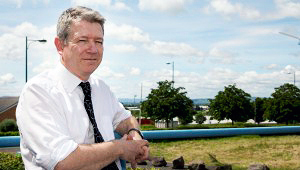GP funding disadvantages patients in deprived areas
Published On Mon 30 Nov 2015 by Roddy Isles

General Practice funding systems in Scotland are “part of the problem” of health inequality, and do not match clinical need in deprived areas where multi-morbidity is highest.
A new study, carried out by researchers at the University of Glasgow’s Institute of Health and Wellbeing and the University of Dundee, has found that while GPs in more deprived areas have more patients who suffer from multiple chronic physical and mental conditions, they do not receive more funding to meet clinical needs.
The research, published in the British Journal of General Practice today, found that practices in the most deprived areas had 38% more patients with multi-morbidity compared with the least deprived and double the number of patients with combined mental and physical multi-morbidity.
Multi-morbidity was defined in three ways for the purpose of the research: two or more chronic health conditions, five or more chronic conditions and combinations of physical and mental conditions.
Evidence from the study also shows that although practices in more deprived areas have younger populations, they also have higher levels of complex multi-morbidity, occurring at a much younger age.
Professor Graham Watt, the Norie Miller Professor of General Practice at the University of Glasgow, said: “On average GPs in more deprived areas have a higher workload with 20% more consultations with patients who are more likely to be multi-morbid with both physical and mental conditions, but do not receive additional funding to address these complex needs. The average NHS spend per patient per annum in the most deprived general practices is £120, compared with £127 in the most affluent half of the country.
“When needs are partially met the health service underachieves in reducing the severity and slowing the progression of health and social problems. The consequence is that patients are admitted to hospital and die earlier than they need to.
“Until allocation formulas in Scotland and the rest of the UK take into account the earlier onset of morbidity in more deprived areas, such funding systems will remain inequitable and continue to be part of the problem of health inequalities rather than part of the solution.”
In Scotland the Scottish Allocation Formula (SAF) determines how funding is distributed between practices. Payments per registered patient are determined by age and sex of the practice population, as well as additional needs such as morbidity and deprivation, and the rurality and remoteness of the practice.
Despite the SAF taking deprivation into account, the study found that practice funding remains broadly flat, even when deprivation increases.
Professor Bruce Guthrie, at the University of Dundee, said, “A flat distribution of funding means practices in deprived areas can only generate increased consultation rates by having shorter consultation times or by working longer hours.
“Universal healthcare coverage provides access to care, but does not in itself equip frontline practitioners to respond proportionately to patients’ clinical needs”.
The researchers comment that successfully funding the general practice system, in a way that meets the needs of all patients, remained a complicated task. While practices in deprived areas had higher number of younger patients with multi-morbidity conditions, practices in more affluent populations have higher numbers of frail older patients, who also have multiple care needs.
Professor Watt said: “The present study of general practice resources, based on funding per patient, is an improvement on previous studies based on incomplete data on numbers of GPs. Practice funding provides a better indication of the total resource available for general practice services, including the employment of GPs, nurses, and other staff, premises and other running costs.”
The researchers restricted their analysis to GP practices in Scotland with no missing data, leaving 956 practices in total, 96.5% of all Scottish general practices.
The study, ‘General Practice funding underpins the persistence of the inverse care law’, is published today in the British Journal of General Practice. The research was funded by the Chief Scientist Office of the Scottish Government Health Directorates.
For media enquiries contact:
Roddy Isles
Head of Corporate Communications
University of Dundee
Nethergate, Dundee, DD1 4HN
Tel: +44 (0)1382 384910
Mobile: 07800 581902
Email: r.isles@dundee.ac.uk